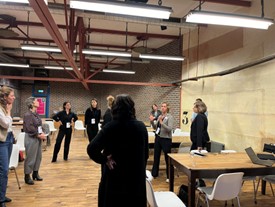AIRinVET results presented and discussed on the Katapult Day 2024
 On October 15th, the AIRinVET team presented the project at the Katapult Day 2024 in a session with attendees from Vocational Education and Training institutes (VET), Higher Professional Education institutes (HPE), and provinces of the Netherlands. After a brief introduction to AIRinVET, supported by the project video, and an explanation of our AIRinVET Framework with its associated dimensions and layers, we focused on various statements within the Research & Innovation dimension of the Framework.
On October 15th, the AIRinVET team presented the project at the Katapult Day 2024 in a session with attendees from Vocational Education and Training institutes (VET), Higher Professional Education institutes (HPE), and provinces of the Netherlands. After a brief introduction to AIRinVET, supported by the project video, and an explanation of our AIRinVET Framework with its associated dimensions and layers, we focused on various statements within the Research & Innovation dimension of the Framework.
Research Capacity: “We share our R&I infrastructure”
- The discussion centred on sharing research infrastructure between VET, HPE, and in some cases, universities. Opinions varied significantly among participants. Some felt that collaboration between VET and HPE was the best, while others found the collaboration between HPE and universities to be better. Most participants indicated that infrastructure is at least partially shared, except for one participant who stated they do not use it at all. Lecturers serve as a pivotal point in VET-HPE-University collaboration.
Research Methods: “We work with a variety of research methods”
- The distribution of answers was similar to the previous statement. Most participants indicated that they use a variety of research methods, although the methods used are highly dependent on the field of study and the level of education (VET or HPE). It was noted that the framework suggests that VET schools also conduct desk research, which was not recognized by all participants. The methods were also described as traditional, while for VET, other methods such as hackathons and learning communities might work better. VET research was described as more in the context of user experience and the use of new technology and valorisation.
Research Expertise (Teachers): “Teachers receive training to improve R&I skills”
- The discussion focused on the difference between teachers and researchers, as they often have different profiles. A critical note was made that attending a training alone does not always yield the desired result. In VET, teachers often do not have time to attend training. In HPE, it is a prerequisite for their work.
Research Expertise (Students): “Students receive training to improve R&I skills”
- There was broad agreement on this: students are generally well-trained, with a clear difference that this training is usually more extensive in HPE than in VET. It was also noted that if teachers do not have research skills, students are less likely to develop them. As a closing remark, it was stated that: Skills must also be tailored to the students’ level.




Subscribe to our newsletter